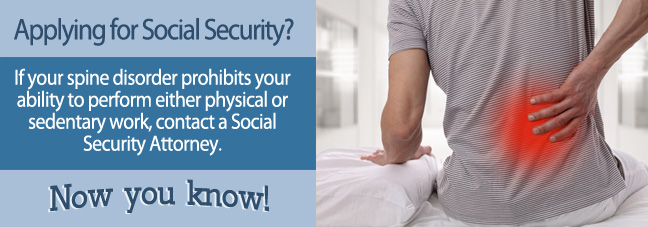Spinal fusion is usually an effective procedure to correct a number of problems connected with your spinal vertebrae. That being said, a spinal fusion does not eliminate any preceding degenerative causes that led to surgery being needed in the first place. As such, you may find that the difficulties in bending over and experiencing back pain make it impossible to continue working. If this is the case for you, you can apply for Social Security disability benefits through the Social Security Administration (SSA).
If you are over 50 years-old, it is generally easier to obtain these disability benefits from the SSA, even if the symptoms you experience do not match the SSA’s Blue Book criteria exactly. This is because the SSA will utilize grid rules to determine whether a number of factors, including your age, allow you to obtain a benefit.
Grid Rules and Qualifying for Disability Benefits with Spinal Fusion Over 50
The SSA uses grid rules to help assess your eligibility for disability benefits with spinal fusion, especially when your symptoms do not quite match those listed in the Blue Book. Factors assessed include the following:
- the skills you have acquired for previous employment;
- whether any of the skills are transferable in another occupation;
- your level of education;
- your age;
- what sort of physical work you are capable of doing.
The older you are, the more lenient the SSA’s assessment becomes when using grid rules.
For example, when you are over 50, the SSA takes your employability into consideration. This is because employers generally become more reluctant to employ people after they reach a certain age. Coupled with this, your age could potentially result in (1) your skills not being as transferrable to another occupation, or (2) your ability to learn new skills may be reduced.

Medical Requirements for Spinal Fusion and Disability Benefits
The symptoms you experience are assessed against the most relevant listing in the SSA’s Blue Book. For spinal fusion, the criteria that are most relevant are listed in Blue Book Section 1.00-Musculoskeletal-Adult.
Spinal fusion itself is a form of surgery, so serious disability is caused by pre-existing degeneration in the spine or a result of surgery or problems that still persist despite the surgery. When the symptoms you have as a result of spinal fusion do not match the criteria in the listing, then this is when the grid rules are used to help determine whether benefits can be justified.
How to Apply for Disability Benefits with Spinal Fusion Over 50
When applying for disability benefits, the three main things you need to demonstrate are as follows:
- Having sufficient work credits;
- Adequate medical evidence that supports your claim for disability benefits;
- Evidence to prove you cannot work for at least the next 12 months.
At age 50, you need a minimum of 7 years of previous employment to have accumulated the 28 work credits you need to obtain disability benefits through the Social Security Disability Insurance (SSDI) system. This is because the SSDI system is based on the amount of Social Security insurance contributions you have paid throughout your employment. The older you are, the more likely you are to have paid enough insurance contributions to qualify.
If the medical evidence you have does not sufficiently establish that your disability matches the SSA’s Blue Book listing, you may still be able to show that your physical state means you cannot work for at least the next 12 months. To do this, you can get a Residual Functional Capacity (RFC) assessment which tests your physical abilities such as how much you can lift or bend.
Get Help with your Spinal Fusion Disability Benefits Claim
The after effects of spinal fusion may mean you are seriously disabled. It can be difficult obtaining disability benefits, but if you are over 50, it can be easier. Using a disability attorney can help you obtain the benefits you need.
Additional Resources
- Spinal Disabilities List
- What Common Health Problems Occur For People Over 50?
- How Severe Does My Spinal Condition Have To Be To Get Disability Benefits?
- How Severe Does My Ankylosing Spondylitis Have To Be To Get Disability Benefits?
- How The Blue Book Can Help You With Your Social Security Disability Claim for Spinal Fusion
- Functional Limitations For Spinal Fusion